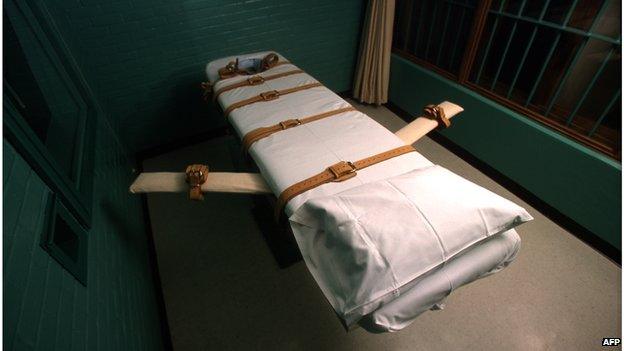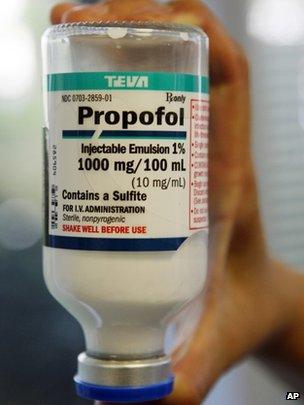Lethal injection: Secretive US states resort to untested drugs
- Published

As American states have found it harder to source drugs for lethal injections, they stand accused of using improvised and possibly painful methods - and buying drugs furtively from unregulated pharmacies.
Joseph Franklin was sentenced to death for shooting and killing a man outside a synagogue in 1977.
He was convicted or blamed for a series of other racially motivated murders, and confessed to being the sniper who shot porn publisher Larry Flynt in 1978, leaving him partially paralysed.
He is due to be executed by lethal injection in Missouri on 20 November, if no last-minute legal appeal is accepted.
The state's authorities had been planning to use propofol, a common anaesthetic that is untested as a lethal injection drug, for the execution of Franklin and a second convicted murderer, Allen Nicklasson.
But Governor Jay Nixon postponed Nicklasson's execution last month after it became apparent that using propofol, some of which was made by a German manufacturer, might put hospital supplies of the drug at risk.
The German manufacturer, warning of the risk of EU sanctions, asked for its propofol back, as did a US supplier.
Missouri then announced it would instead use pentobarbital, sourced not from a pharmaceutical company but from a compounding pharmacy - a pharmacy that makes small batches of drugs on demand for specific clients.
Campaigners object to these pharmacies partly because of an incident last year when a compounded drug in Massachusetts was blamed for an outbreak of meningitis that left more than 60 people dead, but also because they are not subject to regulation by the federal Food and Drug Administration.
"They operate in a kind of grey zone," says Brian Stull of the American Civil Liberties Union (ACLU). "There is no way to verify that what comes from a compounding pharmacy is what it purports to be, and that it is safe and effective."
Lethal injection is the primary method of execution in all 32 states in which the death penalty is permitted, and for several years they have been struggling to obtain the drugs they need.
States employed similar three-drug lethal injection formulas for decades, until the US company that made one key ingredient, sodium thiopental, stopped supplying it. Manufacturers in Europe, where the death penalty is outlawed, have since sought to block the use of their products for executions in the US.
State authorities have reacted in two ways: by using new drugs or combinations of drugs, and occasionally sourcing them from compounding pharmacies.
This week alone three executions were scheduled in three states, using three different lethal injection methods.

Missouri abandoned plans to use Propofol - a common hospital anaesthetic
Texas used pentobarbital to execute Jamie McCoskey on Tuesday, the same day that Florida used a three-drug combination to execute Darius Kimbrough.
Florida's combination included a drug called midazolam, which had never been used for an execution before the state put William Happ to death last month, using the same mixture.
An Associated Press reporter who witnessed Happ's execution said he seemed to remain conscious for longer and move more than people he had seen put to death with different lethal injections.
Ohio was due to use an untested two-drug mixture of midazolam and hydromorphone to execute Ronald Phillips on Thursday, but in an unprecedented step the execution was stayed at the last minute in order to consider a request by Phillips to donate his organs.
Brian Stull says states have been left "scrambling for drugs", and have become increasingly secretive.
"It's become really hard - even for people who follow this issue closely - to know what's going on in each state with each drug because there are so many scenarios proliferating," he says.
Missouri has shielded the compounding pharmacy supplying its pentobarbital from unwelcome publicity by adding it to the execution team - a list of people involved in the execution whose anonymity is protected.
One of those who regards the process as too secretive is Larry Flynt, publisher of Hustler, whom Franklin shot and partially paralysed.
He has put his name to an ACLU motion, which cites allegations that Missouri "appears to have used unsavoury methods to secure and maintain execution drugs and tried to hide that and other information from the public".
Earlier this year lawyers in Georgia obtained a stay of execution for Warren Hill - a convicted murderer - after questioning a new law that makes the way lethal injection drugs are obtained a state secret.
"I think states are making a mistake in being overly secretive and not transparent," says Richard Dieter, executive director of the non-profit Death Penalty Information Center.
"The sense is that they're doing something wrong and hiding something."
Mr Flynt himself opposes the death penalty in principle.
"I have had many years in this wheelchair to think about this very topic," he wrote recently in the Hollywood Reporter.
"As I see it, the sole motivating factor behind the death penalty is vengeance, not justice, and I firmly believe that a government that forbids killing among its citizens should not be in the business of killing itself."
Larry Flynt: ''I'm opposed to the death penalty''
Death penalty opponents have long been concerned that lethal injections could cause extreme pain, violating convicts' constitutional protection from cruel and unusual punishment, and they worry that the increasing use of new, untested drugs may heighten that risk.
Joseph Franklin is among 23 people on death row in Missouri who have appealed against the plan to execute them using pentobarbital from an undisclosed compounding pharmacy, saying it could cause unnecessary suffering. The Missouri Corrections Department said it could not comment because of the litigation.
In past executions across the US, some convicts have writhed, vomited and made sounds after being injected, and sometimes execution staff have struggled to find a vein.
Deborah Denno, a professor at Fordham Law School and death penalty expert, says there is evidence that a substantial number of prison volunteers and people with questionable expertise have been used to carry out executions.
"If you are using drugs that have never been used to kill a human being and are by no means created for that purpose, and those drugs are being used by someone who is ill-trained and doesn't know much about drugs and injections to begin with, then you're creating a particularly high risk process," she says.
Robert Blecker, a professor at New York Law School, who supports the death penalty "in appropriate circumstances", argues that it is odd to be troubled about untested lethal injection formulas.
The risk of a "momentarily painful death" is "very small" he says.
"Why this extraordinary concern for those we have condemned?"
But it's partly because this concern is widespread, and pharmacies fear negative publicity, that the necessary drugs are becoming scarce.
Arkansas Attorney General Dustin McDaniel, whose state has not carried out an execution since 2005, has described the system in the US as "completely broken".
"Let's say that there was magically a vapour, a mist, a pill, a fatal hypnotic stare. You still have to find American manufacturers who are willing to produce it and courts who are willing to accept it," he recently told the National Journal. "I don't see any of that happening."
Follow @BBCNewsMagazine, external on Twitter and on Facebook, external